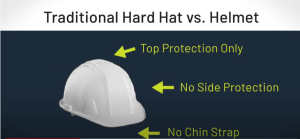 Challenging the status quo, in 2017 Gilbane looked at the traditional construction helmet and researched alternatives that could offer additional protection from front, rear, and side impacts, as well as accommodate eye protection, hearing protection, and the integral chin strap.
Challenging the status quo, in 2017 Gilbane looked at the traditional construction helmet and researched alternatives that could offer additional protection from front, rear, and side impacts, as well as accommodate eye protection, hearing protection, and the integral chin strap.
As noted in our previous blog, for decades, the construction industry has used the same personal protective equipment (PPE) to keep our workers safe; hard hats, high visibility vests, safety-toed boots, gloves and glasses have been responsible for saving numerous lives and preventing countless injuries. But just as design and construction technology progresses among construction companies, so too should the critical equipment we rely on to protect our people.
Traumatic Brain Injuries in Construction
This year, the National Construction Safety Week committee put forth an effort to normalize the idea of utilizing helmets in the Construction industry. It is known that construction workers sustain more traumatic brain injuries (TBIs) than employees at any other type of workplace in the US. TBIs represent 25% of all construction fatalities, and more than half of fatal work-related traumatic injuries were a result of falls. Safety helmets with the use of chin straps dramatically reduce the frequency and severity of TBIs due to their retention systems and ability to protect against lateral impact and penetration.
Watch this video provided by Safety Week to learn how safety helmets dramatically reduce the frequency and severity of traumatic injuries and fatalities on construction sites.
Why Switch to Safety Helmets?
Our Approach to Total Safety
At Gilbane, it’s important that the safety actions of our employees and colleagues are driven by choice, not just from formal compliance. The Gilbane Cares philosophy is built on the belief that everyone – our employees, clients, partners, and the public – deserves a safe, healthy, and secure work environment. Wellness and safety are paired with the recognition that the health of our employees impacts their ability to remain safe and injury free at work. This philosophy is core to our environmental, social, and governance platform. Read more in our Gilbane Building Company ESG Report.
When we started our Incident and Injury Free journey 14 years ago, we set out to raise the bar every day through Gilbane Cares. We broadened that objective by also adding “Caring” to our core values. In 2018, Gilbane continued the spirit of Caring by providing employees with Kask helmets with chin straps that met certain performance standards and which also aligned with our updated Safety Non-Negotiable regarding PPE requirements. Since then, helmet options have expanded and there are several that meet the rigorous performance standards of the original helmets. Today, many of our businesses are expanding this commitment of Caring to our trade partners, because it is the right thing to do.
Gilbane employees have the same commitment to safety, are committed to wearing a helmet with a chin strap fastened, and are held accountable for ensuring our trade partners adopt helmets with chin straps as part of their everyday PPE on new projects moving forward. We recognize this shift will not be easy for everyone, but we truly believe it is the right thing to do to prevent head injuries.

